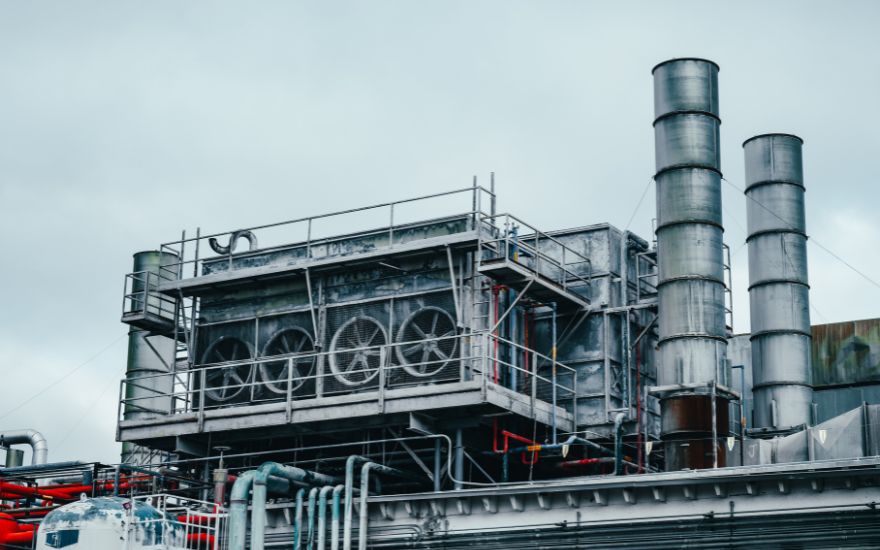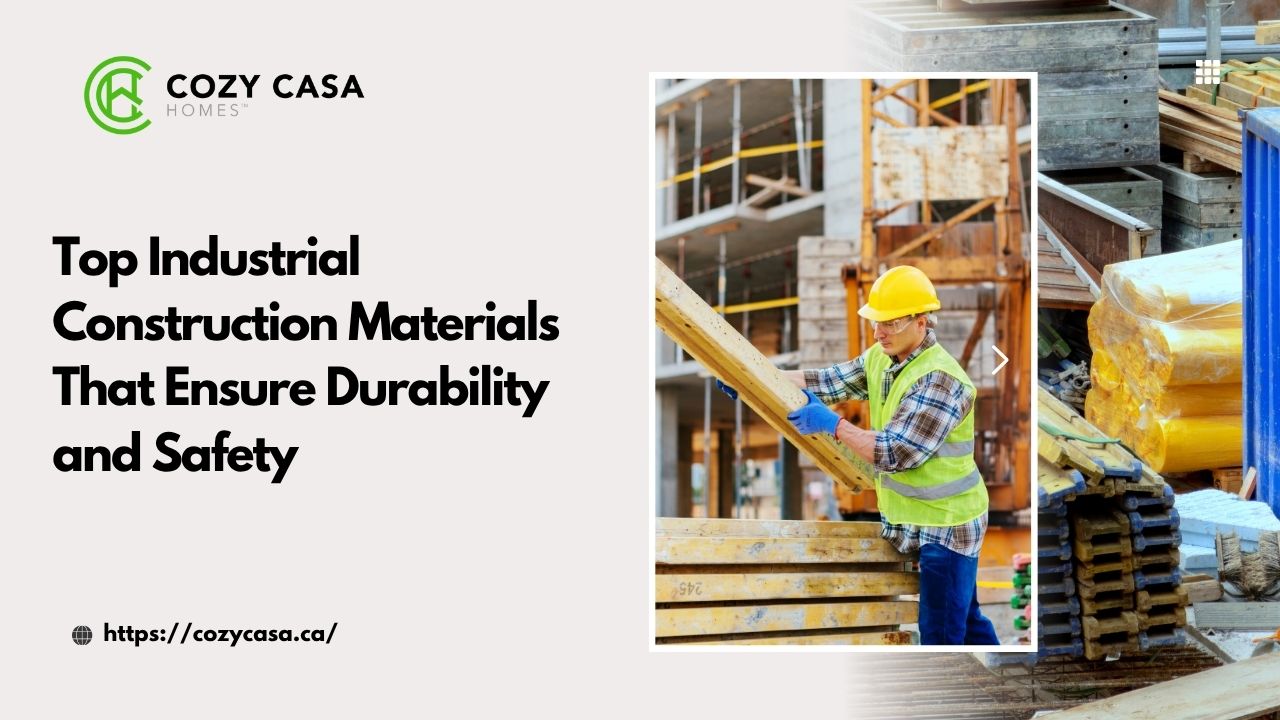Industrial construction is not just about putting up walls and roofing—it’s about developing high-performance spaces that can support complex operations, heavy equipment, and advanced infrastructure. Whether you are planning a warehouse, manufacturing facility, or distribution center, the right construction partner makes all the difference. Cozy Casa brings unmatched expertise, reliability, and innovation to the table, helping businesses thrive with industrial spaces that are efficient, durable, and scalable.
In this blog, we will take a deep dive into how Cozy Casa stands out in the industrial construction industry. From design strategies and engineering practices to material selection and energy efficiency, this information-based guide offers detailed insights into what makes Cozy Casa the ideal partner for your next industrial project. Ready to learn how we ensure performance and excellence in every square foot? Let’s begin. Explore our services here.
Key Considerations Before Selecting an Industrial Construction Partner
Before diving into the hows and whys of Cozy Casa’s superior approach, it’s essential to understand the foundational factors that influence any industrial construction project. These considerations ensure a smoother construction process and better long-term functionality.
Understanding Your Industrial Requirements
Before breaking ground, a comprehensive understanding of operational needs is critical. Industrial facilities vary widely—some require advanced climate control, others need reinforced flooring for heavy machinery. Knowing these requirements from the outset informs layout, materials, and construction methods. Two secondary keywords here are “operational efficiency” and “structural load-bearing.”
Failing to outline precise needs can lead to costly redesigns. Cozy Casa helps clients through detailed needs assessments to guarantee nothing is overlooked. With experience across sectors like logistics, food processing, and light manufacturing, our team tailors each solution for maximum performance.
Understanding how space will be used allows Cozy Casa to recommend optimized configurations, thereby reducing future expansion costs. This long-term vision distinguishes our approach from traditional builders.
Compliance with Zoning and Regulations
Industrial buildings are subject to strict zoning laws and construction regulations. Navigating these complexities requires deep knowledge of municipal, provincial, and federal codes. Secondary keywords include “building permits” and “regulatory compliance.”
Cozy Casa’s seasoned professionals manage all regulatory hurdles, saving clients time and legal headaches. From environmental assessments to fire safety regulations, we ensure every project is compliant from the start.
Understanding and adhering to these rules can save weeks in delays and reduce the risk of fines. Cozy Casa incorporates early-stage regulatory consultation into every project timeline to streamline approvals and avoid compliance issues.
Budget Planning and Cost Control
Staying on budget is a top concern for industrial developers. Knowing how to forecast, monitor, and control costs ensures financial viability. Secondary keywords: “cost estimation” and “construction budgeting.”
Our team utilizes advanced budgeting software and industry benchmarks to provide transparent cost projections. This financial clarity allows clients to make informed decisions without compromising on quality.
In addition, we conduct regular cost reviews throughout the project, keeping clients informed about expenditures and cost-saving alternatives. This proactive approach prevents budget overruns and promotes trust.
We also negotiate directly with vendors and subcontractors to lock in the most competitive rates. These strategic partnerships help lower expenses while maintaining exceptional quality standards.
Selecting the Right Materials
Industrial spaces endure heavy usage. Selecting materials that offer durability, safety, and performance is crucial. Key secondary keywords: “industrial-grade materials” and “long-term durability.”
Cozy Casa collaborates with top suppliers to source robust and sustainable materials that can withstand industrial wear and tear. Whether it’s corrosion-resistant steel or reinforced concrete, our choices prioritize longevity.
Additionally, we assess environmental exposure, chemical usage, and thermal demands when choosing materials. This ensures each component is engineered to meet the unique requirements of your facility.
We prioritize materials that are both high-performing and low-maintenance, saving our clients ongoing operational costs. These smart selections lead to stronger ROI over time.
Project Timeline and Delivery Guarantees
Meeting deadlines in industrial construction can impact business continuity and ROI. Ensuring accurate scheduling and on-time delivery is a vital part of the planning process. Keywords: “project scheduling” and “on-time delivery.”
Cozy Casa uses Gantt charts and project management software to create realistic timelines. We commit to deadlines with minimal disruption, allowing clients to plan their operations confidently.
With our phased construction planning, we often allow sections of the facility to be operational while others are still under construction. This flexibility accelerates productivity and shortens the overall project lifespan.
In cases of unforeseen delays, our contingency planning ensures swift decision-making and minimal downtime. Our transparent communication keeps all stakeholders aligned.
Cozy Casa’s Approach to Industrial Construction Excellence
After reviewing what to look for in an industrial construction partner, let’s explore how Cozy Casa integrates those best practices into every stage of its projects.
Custom Design with Performance in Mind
Every industrial space starts with a design. Cozy Casa creates custom layouts that align with operational flow, space optimization, and safety standards. Keywords: “industrial layout planning” and “performance design.”
Our architects work hand-in-hand with engineers and clients to design environments that boost productivity and streamline logistics. From ceiling heights to loading docks, every detail is tailored.
We also conduct workflow simulations during the design phase to identify bottlenecks and optimize movement within the facility. These insights translate into better layouts and increased output.
Our flexible design approach allows for future scalability. We plan spaces that can adapt as your operational needs evolve, reducing the need for costly renovations down the line.
Engineering for Functionality and Safety
Our structural and civil engineers develop plans that ensure the building can withstand daily stressors and extreme conditions. Keywords: “structural integrity” and “industrial engineering.”
Whether you’re operating a high-vibration production line or housing sensitive equipment, we engineer your facility to meet the highest performance benchmarks.
All engineering designs undergo peer review and rigorous safety analysis. Our quality assurance processes ensure every element meets both current standards and future adaptability needs.
We also integrate seismic and wind resistance measures based on local geographic data, ensuring both worker safety and long-term structural reliability.
Efficient Site Management and Execution
Site management is a balancing act involving coordination, logistics, and real-time problem solving. Keywords: “construction supervision” and “site logistics.”
Our site managers oversee each phase, keeping communication clear and progress steady. Using digital tools, we track inventory, labor, and machinery to avoid delays.
We also implement lean construction practices to reduce waste and optimize resource allocation. This improves project speed and environmental responsibility.
Our proactive issue resolution strategies empower our managers to solve problems quickly, keeping projects on track and within budget.
Sustainable Building Practices
Sustainability in industrial construction is more than a trend—it’s a necessity. Cozy Casa incorporates green technologies and practices. Keywords: “energy-efficient construction” and “sustainable building materials.”
We utilize energy-efficient insulation, lighting, and HVAC systems to reduce operational costs and carbon footprint. LEED-certified practices are standard across all projects.
By integrating water conservation systems and renewable energy sources, we build facilities that meet today’s sustainability goals and tomorrow’s environmental standards.
Our green construction strategies also enhance indoor air quality and thermal comfort, promoting healthier work environments for your staff.
Smart Integration of Technology
Modern industrial facilities benefit from automation and IoT. Cozy Casa integrates tech infrastructure during the construction phase. Keywords: “smart buildings” and “industrial automation.”
We pre-install smart wiring, sensor systems, and digital controls to make future tech upgrades seamless and cost-effective.
Our smart infrastructure supports predictive maintenance, energy monitoring, and integrated logistics. This enables clients to run more efficient, secure, and scalable operations.
We also offer consulting on emerging technologies, ensuring your facility stays ahead of digital innovation trends for years to come.
Why Choose Cozy Casa for Your Industrial Project
When it comes to delivering high-performance industrial spaces, Cozy Casa is more than a builder—we’re a strategic partner. Our team understands that these facilities are the heartbeat of your operations. That’s why we emphasize collaboration, precision, and adaptability in every phase.
With Cozy Casa, you receive more than just construction services. You gain access to a network of design experts, regulatory advisors, and project managers who align their goals with yours. Our commitment to excellence is reflected in every structure we deliver.
Plus, our customer-first approach ensures that every step of the process is clear, consultative, and custom-fit to your needs. With industry-leading guarantees on timelines, quality, and support, Cozy Casa is your trusted ally in building industrial spaces that last.
Our proven track record, commitment to innovation, and deep industry knowledge mean we can handle even the most complex industrial builds. Choose Cozy Casa, and build with confidence.
Conclusion
Industrial construction is a multifaceted endeavor where precision, performance, and reliability intersect. Cozy Casa brings unmatched value to every project through thoughtful design, expert engineering, and rigorous site execution. By integrating sustainability and smart technology, we future-proof your industrial space for evolving needs.
Choosing Cozy Casa means choosing a partner who understands the stakes and delivers results. Whether you’re expanding your logistics capacity or launching a new manufacturing hub, we help you build not just structures but strong foundations for business growth. Learn more or schedule a consultation today.
FAQs
- What types of industrial buildings does Cozy Casa construct?
Cozy Casa specializes in warehouses, manufacturing plants, logistics centers, and distribution facilities. - Does Cozy Casa handle building permits and zoning?
Yes, we manage all regulatory compliance and permit acquisition processes. - Can Cozy Casa construct eco-friendly industrial buildings?
Absolutely. We incorporate green building practices and sustainable materials in all our projects. - How long does an industrial construction project usually take?
Timelines vary, but Cozy Casa provides accurate scheduling with realistic milestones. - What safety standards does Cozy Casa follow?
We comply with all provincial and federal safety regulations and conduct regular audits. - Are your construction materials durable for industrial use?
Yes, we source high-performance, industrial-grade materials designed for longevity. - Can Cozy Casa customize facility designs based on my operations?
Yes, we offer fully customized designs tailored to your specific industrial needs. - Does Cozy Casa offer post-construction support?
We provide warranty services, inspections, and maintenance guidance post-completion. - Is there a project minimum size for industrial construction?
No project is too big or too small. We evaluate all projects on feasibility and impact.
How can I get started with Cozy Casa?
Visit our contact page to book a free consultation.

